Unit 6 Do you like bananas? Section A (2a-2d)课件(共30张PPT,内嵌音频) 2023-2024学年人教版七年级英语上册
文档属性
| 名称 | Unit 6 Do you like bananas? Section A (2a-2d)课件(共30张PPT,内嵌音频) 2023-2024学年人教版七年级英语上册 | 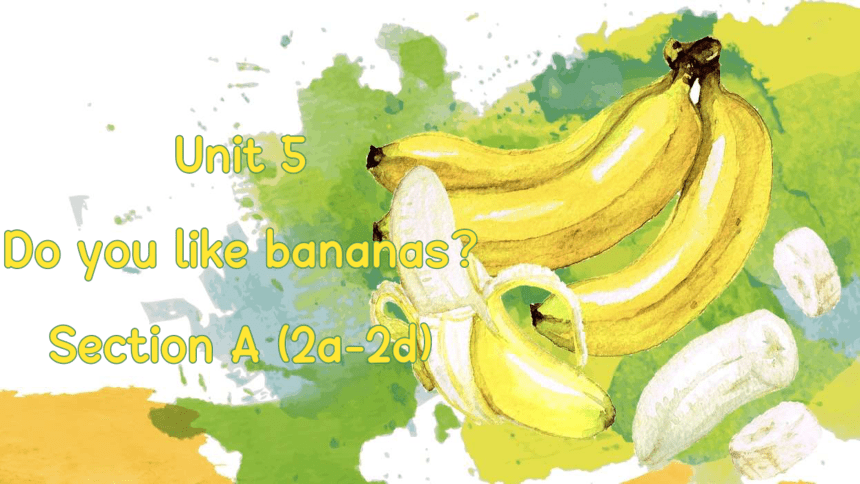 | |
| 格式 | pptx | ||
| 文件大小 | 7.6MB | ||
| 资源类型 | 教案 | ||
| 版本资源 | 人教新目标(Go for it)版 | ||
| 科目 | 英语 | ||
| 更新时间 | 2023-11-27 10:30:43 | ||
图片预览

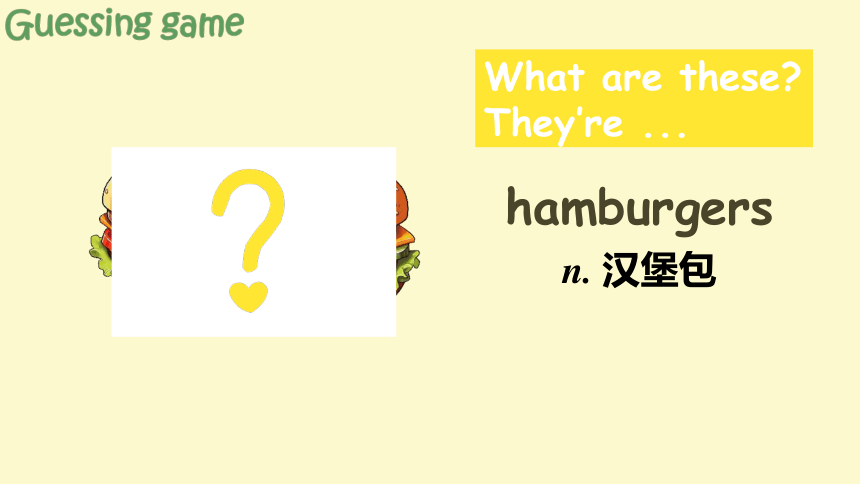
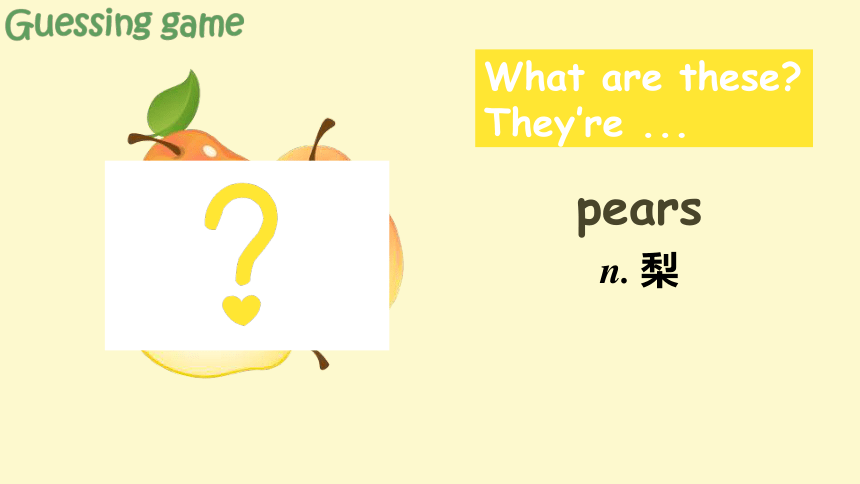
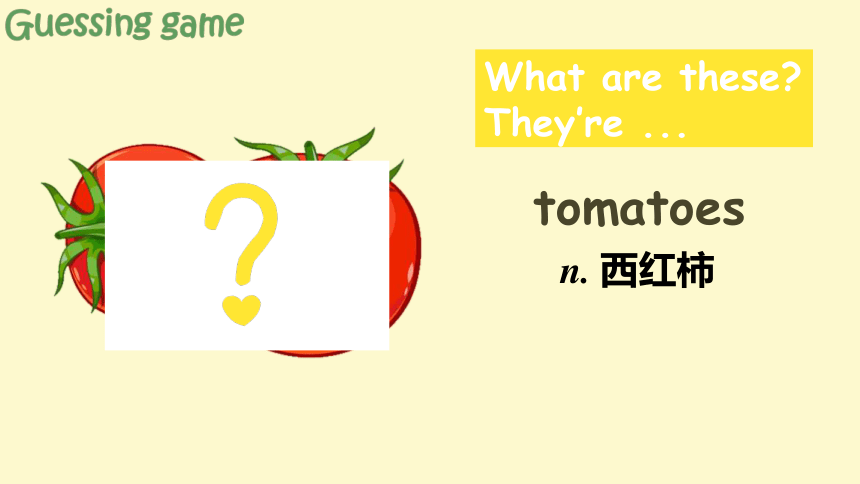
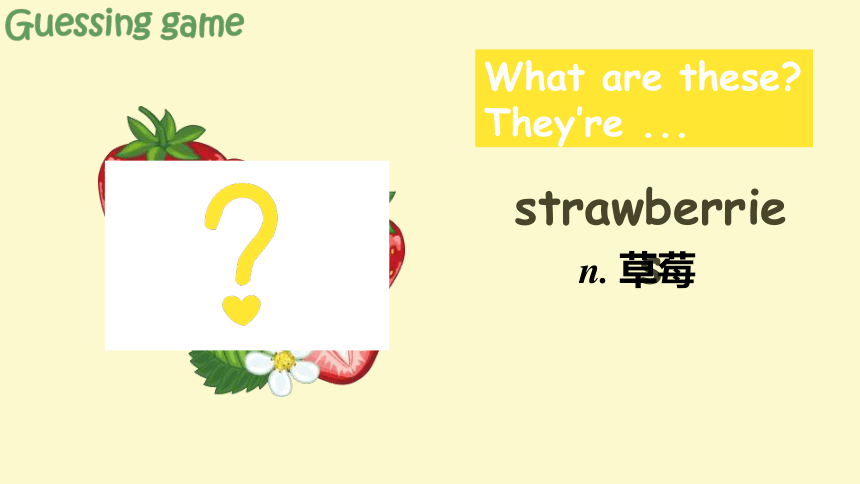
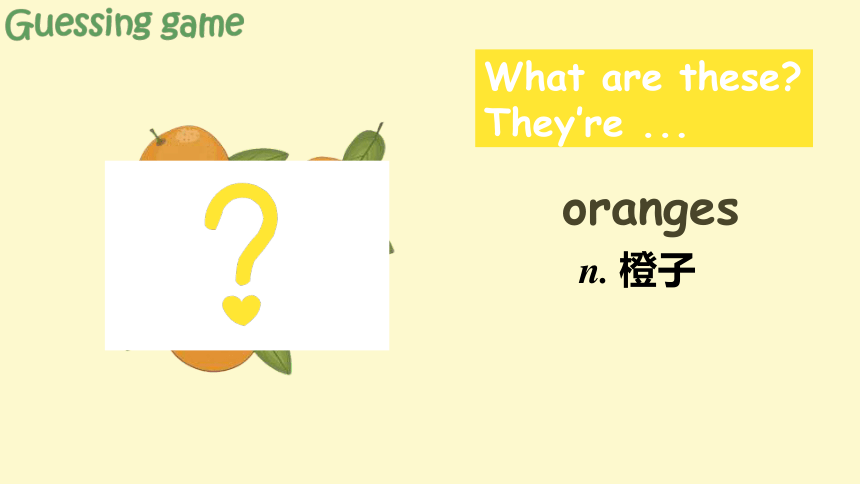
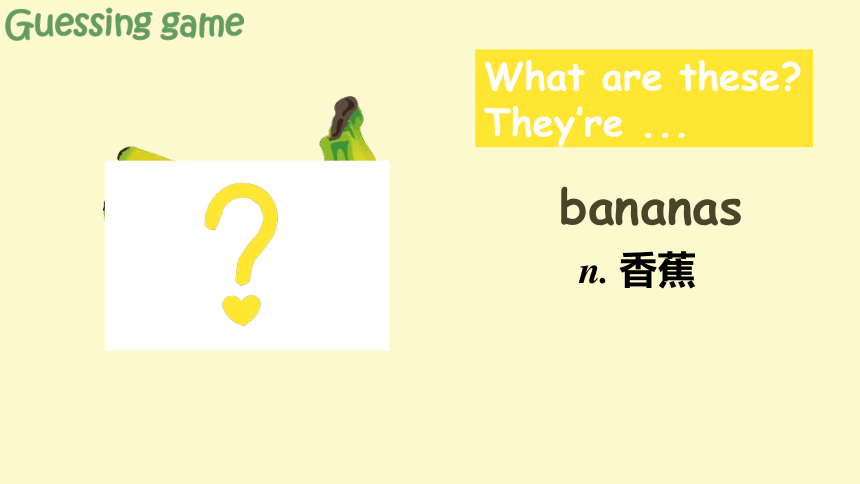
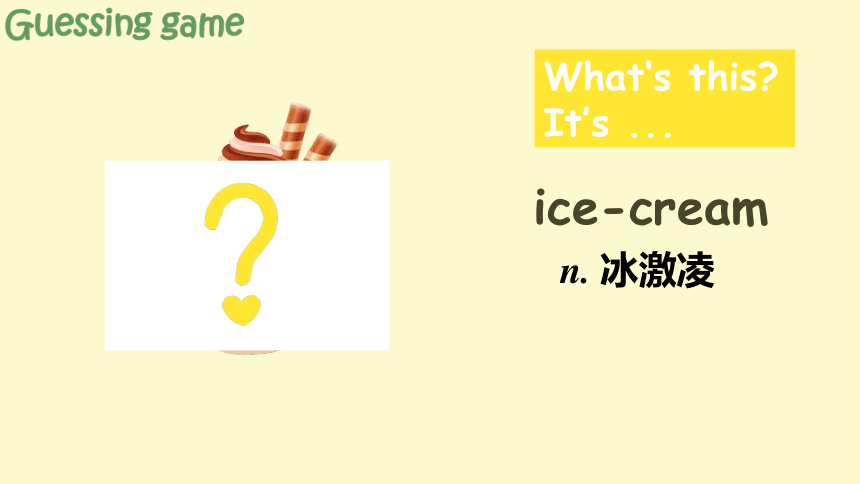
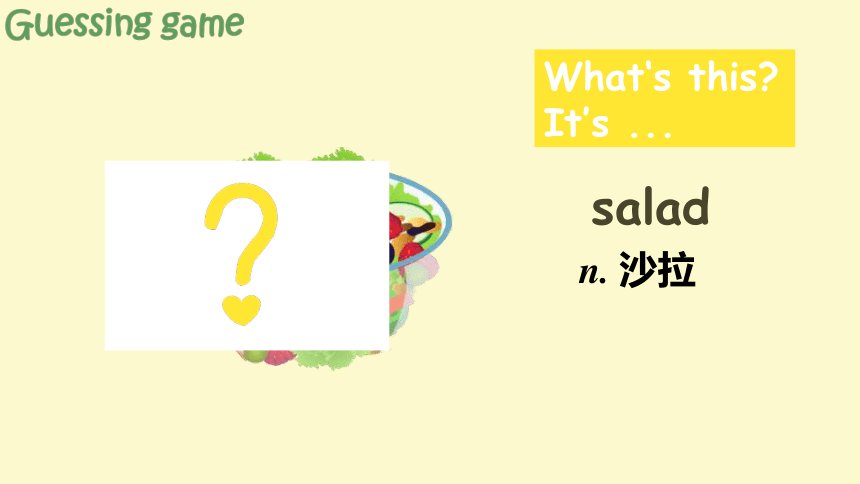
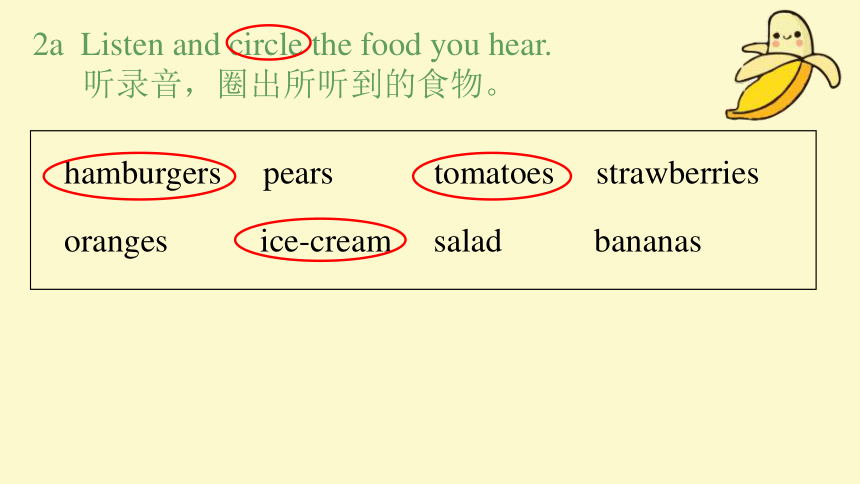
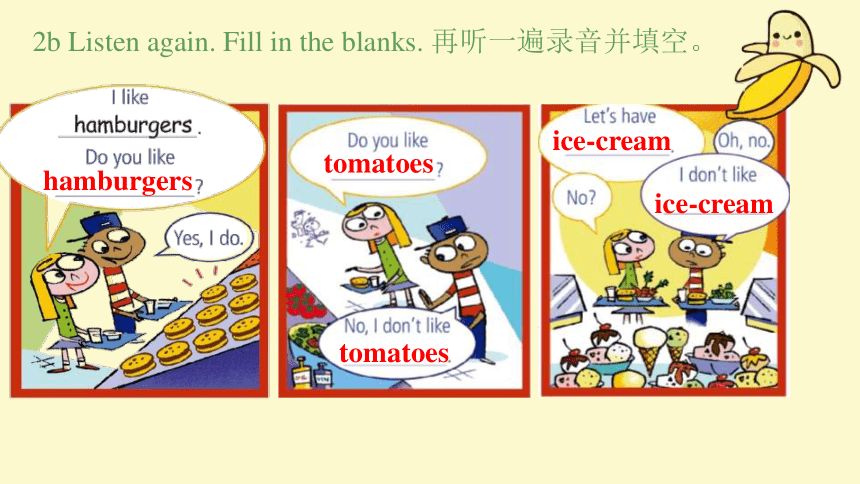

文档简介
(共30张PPT)
hamburgers
n. 汉堡包
What are these
They’re ...
pears
n. 梨
What are these
They’re ...
tomatoes
n. 西红柿
What are these
They’re ...
strawberries
n. 草莓
What are these
They’re ...
oranges
n. 橙子
What are these
They’re ...
bananas
n. 香蕉
What are these
They’re ...
ice-cream
n. 冰激凌
What‘s this
It’s ...
salad
n. 沙拉
What‘s this
It’s ...
2a Listen and circle the food you hear.
听录音,圈出所听到的食物。
hamburgers pears tomatoes strawberries
oranges ice-cream salad bananas
hamburgers
tomatoes
tomatoes
ice-cream
ice-cream
2b Listen again. Fill in the blanks. 再听一遍录音并填空。
1. Does the boy like hamburgers How about the girl
2. Does the boy like tomatoes
3. Does the boy like the ice-cream
Yes, he does.
She likes hamburgers, too.
No, he doesn’t.
No, he doesn’t.
2b Listen again, and answer the questions.
再听一遍录音,回答问题。
2b Read the conversations in pairs.
1. Girl: I like hamburgers. Do you like hamburgers
Boy: Yes, I do.
2. Girl: Do you like tomatoes
Boy: No, I don’t like tomatoes.
3. Girl: Let’s have ice-cream.
Boy: Oh, no.
Girl: No
Boy: I don’t like ice-cream.
I like tomatoes. Do you like tomatoes
Yes, I do.
No, I don’t.
Do you like ice-cream
2c Practice the conversations in 2b. Give answers that are true for you.
Do a survey in groups of four and give a report. 练习上面的对话,
并谈谈自己的真实感受。
I know a boy. His name is John. John’s birthday is next
week. So his friends are preparing for his birthday dinner. But they don’t want John to know it.
生日
(中午或晚上吃的)正餐
2d Read the conversation and answer the questions.
1. When is John’s birthday dinner
It’s next week.
2. Does John like salad
Yes, he does.
3. Does Jack like salad
No, he doesn’t.
4. What fruit does John like
Strawberries and apples.
Jack: Hey, John’s birthday dinner is next week. Let’s think about the food.
Tom: Sure. How about burgers, vegetable salad, and some
fruit
Bill: Sounds good. John likes hamburgers.
Jack: Oh, I don’t like salad.
Bill: But John likes salad, and it’s his birthday.
Jack: Yes, you’re right. What about the fruit
Tom: I think John likes strawberries and apples.
Bill: OK. Let’s have strawberries and apples then.
2d Role-play the conversation. 分角色表演对话。
Jack: Hey, John’s birthday dinner is next week. Let’s think about the food.
Tom: Sure. How about burgers, vegetable salad, and some
fruit
Bill: Sounds good. John likes hamburgers.
Jack: Oh, I don’t like salad.
Bill: But John likes salad, and it’s his birthday.
Jack: Yes, you’re right. What about the fruit
Tom: I think John likes strawberries and apples.
Bill: OK. Let’s have strawberries and apples then.
Language points
birthday n.生日 →是由birth(n.出生) + day(n.一日;一天)构成的合成词
类似合成词:
classroom (class+room)教室
notebook (note+book)笔记本
schoolbag (school+bag) 书包
Jack: Hey, John’s birthday dinner is next week. Let’s think about the food.
Tom: Sure. How about burgers, vegetable salad, and some
fruit
Bill: Sounds good. John likes hamburgers.
Jack: Oh, I don’t like salad.
Bill: But John likes salad, and it’s his birthday.
Jack: Yes, you’re right. What about the fruit
Tom: I think John likes strawberries and apples.
Bill: OK. Let’s have strawberries and apples then.
Language points
dinner n. (中午或晚上吃的)正餐
dinner 指一日中的主餐,可中午吃,也可晚间吃。但多用于指宴请客人的正式的一餐。
have dinner 吃正餐
have ... for dinner 正餐吃……
我们晚餐吃汉堡吧。(翻译)
Let’s have hamburgers for dinner.
Jack: Hey, John’s birthday dinner is next week. Let’s think about the food.
Tom: Sure. How about burgers, vegetable salad, and some
fruit
Bill: Sounds good. John likes hamburgers.
Jack: Oh, I don’t like salad.
Bill: But John likes salad, and it’s his birthday.
Jack: Yes, you’re right. What about the fruit
Tom: I think John likes strawberries and apples.
Bill: OK. Let’s have strawberries and apples then.
Language points
week n. 周;星期
last week 上周
this week 本周
next week 下周
Jack: Hey, John’s birthday dinner is next week. Let’s think about the food.
Tom: Sure. How about burgers, vegetable salad, and some
fruit
Bill: Sounds good. John likes hamburgers.
Jack: Oh, I don’t like salad.
Bill: But John likes salad, and it’s his birthday.
Jack: Yes, you’re right. What about the fruit
Tom: I think John likes strawberries and apples.
Bill: OK. Let’s have strawberries and apples then.
Language points
think about 思考;考虑
think about sth. 思考某物/某事
think about doing sth. 考虑做某事
Let me think about it. 让我考虑考虑(这件事)。
He thinks about eating hamburgers in KFC.
他考虑去肯德基吃汉堡包。
Jack: Hey, John’s birthday dinner is next week. Let’s think about the food.
Tom: Sure. How about burgers, vegetable salad, and some
fruit
Bill: Sounds good. John likes hamburgers.
Jack: Oh, I don’t like salad.
Bill: But John likes salad, and it’s his birthday.
Jack: Yes, you’re right. What about the fruit
Tom: I think John likes strawberries and apples.
Bill: OK. Let’s have strawberries and apples then.
Language points
sure adv. 当然;肯定;一定
→常用来回答一般疑问句,意为“当然;的确”,相当于yes
—Are you going with us 你和我们一起去吗?
—Sure. 当然啦。
Jack: Hey, John’s birthday dinner is next week. Let’s think about the food.
Tom: Sure. How about burgers, vegetable salad, and some
fruit
Bill: Sounds good. John likes hamburgers.
Jack: Oh, I don’t like salad.
Bill: But John likes salad, and it’s his birthday.
Jack: Yes, you’re right. What about the fruit
Tom: I think John likes strawberries and apples.
Bill: OK. Let’s have strawberries and apples then.
How about ... ……怎么样?
= What about ... →用来询问情况或征求意见
about是介词,其后跟n./pron./V ing
How about nine o’clock 9点钟怎么样
I like strawberries. How about you 我喜欢草莓。你呢
What about having hamburgers 吃汉堡包怎么样
Language points
Jack: Hey, John’s birthday dinner is next week. Let’s think about the food.
Tom: Sure. How about burgers, vegetable salad, and some
fruit
Bill: Sounds good. John likes hamburgers.
Jack: Oh, I don’t like salad.
Bill: But John likes salad, and it’s his birthday.
Jack: Yes, you’re right. What about the fruit
Tom: I think John likes strawberries and apples.
Bill: OK. Let’s have strawberries and apples then.
Language points
right adj.正确的;适当的
表示认同对方观点→That’s right./You are right.
Jack: Hey, John’s birthday dinner is next week. Let’s think about the food.
Tom: Sure. How about burgers, vegetable salad, and some
fruit
Bill: Sounds good. John likes hamburgers.
Jack: Oh, I don’t like salad.
Bill: But John likes salad, and it’s his birthday.
Jack: Yes, you’re right. What about the fruit
Tom: I think John likes strawberries and apples.
Bill: OK. Let’s have strawberries and apples then.
Language points
have
1) v. 有;拥有
I have a white watch. 我有块白色手表。
2) v. 吃(= eat);喝
Let’s have some milk and some bread.
我们喝些牛奶,吃些面包吧。
Jack: Hey, John’s birthday dinner is next week. Let’s think about the food.
Tom: Sure. How about burgers, vegetable salad, and some
fruit
Bill: Sounds good. John likes hamburgers.
Jack: Oh, I don’t like salad.
Bill: But John likes salad, and it’s his birthday.
Jack: Yes, you’re right. What about the fruit
Tom: I think John likes strawberries and apples.
Bill: OK. Let’s have strawberries and apples then.
Language points
then adv. 那么;这样
→常放在句首或句尾,用来缓和语气。
What do you think of it then 那么你如何看待这件事
Then, let’s begin. 那么,咱们开始吧。
Jack: Hey, John’s birthday dinner is next week. Let’s think about the food.
Tom: Sure. How about burgers, vegetable salad, and some
fruit
Bill: Sounds good. John likes hamburgers.
Jack: Oh, I don’t like salad.
Bill: But John likes salad, and it’s his birthday.
Jack: Yes, you’re right. What about the fruit
Tom: I think John likes strawberries and apples.
Bill: OK. Let’s have strawberries and apples then.
Language points
I. Fill in the blanks with the correct forms.
1. My (生日) is next week.
2. What do you have for (正餐)
3. We like (蔬菜) for lunch.
4. Yes, you are (正确的).
5. —Do you like (沙拉)
—Yes, I do.
Exercises
dinner
vegetables
right
salad
birthday
II. Finish the sentences.
1. 你喜欢牛奶吗?
you
2. 水果怎么样?
the fruit
3. 我需要一些时间来考虑这个问题。
I need some time to this problem.
Exercises
milk
Do
like
What/How
about
think
about
hamburgers
n. 汉堡包
What are these
They’re ...
pears
n. 梨
What are these
They’re ...
tomatoes
n. 西红柿
What are these
They’re ...
strawberries
n. 草莓
What are these
They’re ...
oranges
n. 橙子
What are these
They’re ...
bananas
n. 香蕉
What are these
They’re ...
ice-cream
n. 冰激凌
What‘s this
It’s ...
salad
n. 沙拉
What‘s this
It’s ...
2a Listen and circle the food you hear.
听录音,圈出所听到的食物。
hamburgers pears tomatoes strawberries
oranges ice-cream salad bananas
hamburgers
tomatoes
tomatoes
ice-cream
ice-cream
2b Listen again. Fill in the blanks. 再听一遍录音并填空。
1. Does the boy like hamburgers How about the girl
2. Does the boy like tomatoes
3. Does the boy like the ice-cream
Yes, he does.
She likes hamburgers, too.
No, he doesn’t.
No, he doesn’t.
2b Listen again, and answer the questions.
再听一遍录音,回答问题。
2b Read the conversations in pairs.
1. Girl: I like hamburgers. Do you like hamburgers
Boy: Yes, I do.
2. Girl: Do you like tomatoes
Boy: No, I don’t like tomatoes.
3. Girl: Let’s have ice-cream.
Boy: Oh, no.
Girl: No
Boy: I don’t like ice-cream.
I like tomatoes. Do you like tomatoes
Yes, I do.
No, I don’t.
Do you like ice-cream
2c Practice the conversations in 2b. Give answers that are true for you.
Do a survey in groups of four and give a report. 练习上面的对话,
并谈谈自己的真实感受。
I know a boy. His name is John. John’s birthday is next
week. So his friends are preparing for his birthday dinner. But they don’t want John to know it.
生日
(中午或晚上吃的)正餐
2d Read the conversation and answer the questions.
1. When is John’s birthday dinner
It’s next week.
2. Does John like salad
Yes, he does.
3. Does Jack like salad
No, he doesn’t.
4. What fruit does John like
Strawberries and apples.
Jack: Hey, John’s birthday dinner is next week. Let’s think about the food.
Tom: Sure. How about burgers, vegetable salad, and some
fruit
Bill: Sounds good. John likes hamburgers.
Jack: Oh, I don’t like salad.
Bill: But John likes salad, and it’s his birthday.
Jack: Yes, you’re right. What about the fruit
Tom: I think John likes strawberries and apples.
Bill: OK. Let’s have strawberries and apples then.
2d Role-play the conversation. 分角色表演对话。
Jack: Hey, John’s birthday dinner is next week. Let’s think about the food.
Tom: Sure. How about burgers, vegetable salad, and some
fruit
Bill: Sounds good. John likes hamburgers.
Jack: Oh, I don’t like salad.
Bill: But John likes salad, and it’s his birthday.
Jack: Yes, you’re right. What about the fruit
Tom: I think John likes strawberries and apples.
Bill: OK. Let’s have strawberries and apples then.
Language points
birthday n.生日 →是由birth(n.出生) + day(n.一日;一天)构成的合成词
类似合成词:
classroom (class+room)教室
notebook (note+book)笔记本
schoolbag (school+bag) 书包
Jack: Hey, John’s birthday dinner is next week. Let’s think about the food.
Tom: Sure. How about burgers, vegetable salad, and some
fruit
Bill: Sounds good. John likes hamburgers.
Jack: Oh, I don’t like salad.
Bill: But John likes salad, and it’s his birthday.
Jack: Yes, you’re right. What about the fruit
Tom: I think John likes strawberries and apples.
Bill: OK. Let’s have strawberries and apples then.
Language points
dinner n. (中午或晚上吃的)正餐
dinner 指一日中的主餐,可中午吃,也可晚间吃。但多用于指宴请客人的正式的一餐。
have dinner 吃正餐
have ... for dinner 正餐吃……
我们晚餐吃汉堡吧。(翻译)
Let’s have hamburgers for dinner.
Jack: Hey, John’s birthday dinner is next week. Let’s think about the food.
Tom: Sure. How about burgers, vegetable salad, and some
fruit
Bill: Sounds good. John likes hamburgers.
Jack: Oh, I don’t like salad.
Bill: But John likes salad, and it’s his birthday.
Jack: Yes, you’re right. What about the fruit
Tom: I think John likes strawberries and apples.
Bill: OK. Let’s have strawberries and apples then.
Language points
week n. 周;星期
last week 上周
this week 本周
next week 下周
Jack: Hey, John’s birthday dinner is next week. Let’s think about the food.
Tom: Sure. How about burgers, vegetable salad, and some
fruit
Bill: Sounds good. John likes hamburgers.
Jack: Oh, I don’t like salad.
Bill: But John likes salad, and it’s his birthday.
Jack: Yes, you’re right. What about the fruit
Tom: I think John likes strawberries and apples.
Bill: OK. Let’s have strawberries and apples then.
Language points
think about 思考;考虑
think about sth. 思考某物/某事
think about doing sth. 考虑做某事
Let me think about it. 让我考虑考虑(这件事)。
He thinks about eating hamburgers in KFC.
他考虑去肯德基吃汉堡包。
Jack: Hey, John’s birthday dinner is next week. Let’s think about the food.
Tom: Sure. How about burgers, vegetable salad, and some
fruit
Bill: Sounds good. John likes hamburgers.
Jack: Oh, I don’t like salad.
Bill: But John likes salad, and it’s his birthday.
Jack: Yes, you’re right. What about the fruit
Tom: I think John likes strawberries and apples.
Bill: OK. Let’s have strawberries and apples then.
Language points
sure adv. 当然;肯定;一定
→常用来回答一般疑问句,意为“当然;的确”,相当于yes
—Are you going with us 你和我们一起去吗?
—Sure. 当然啦。
Jack: Hey, John’s birthday dinner is next week. Let’s think about the food.
Tom: Sure. How about burgers, vegetable salad, and some
fruit
Bill: Sounds good. John likes hamburgers.
Jack: Oh, I don’t like salad.
Bill: But John likes salad, and it’s his birthday.
Jack: Yes, you’re right. What about the fruit
Tom: I think John likes strawberries and apples.
Bill: OK. Let’s have strawberries and apples then.
How about ... ……怎么样?
= What about ... →用来询问情况或征求意见
about是介词,其后跟n./pron./V ing
How about nine o’clock 9点钟怎么样
I like strawberries. How about you 我喜欢草莓。你呢
What about having hamburgers 吃汉堡包怎么样
Language points
Jack: Hey, John’s birthday dinner is next week. Let’s think about the food.
Tom: Sure. How about burgers, vegetable salad, and some
fruit
Bill: Sounds good. John likes hamburgers.
Jack: Oh, I don’t like salad.
Bill: But John likes salad, and it’s his birthday.
Jack: Yes, you’re right. What about the fruit
Tom: I think John likes strawberries and apples.
Bill: OK. Let’s have strawberries and apples then.
Language points
right adj.正确的;适当的
表示认同对方观点→That’s right./You are right.
Jack: Hey, John’s birthday dinner is next week. Let’s think about the food.
Tom: Sure. How about burgers, vegetable salad, and some
fruit
Bill: Sounds good. John likes hamburgers.
Jack: Oh, I don’t like salad.
Bill: But John likes salad, and it’s his birthday.
Jack: Yes, you’re right. What about the fruit
Tom: I think John likes strawberries and apples.
Bill: OK. Let’s have strawberries and apples then.
Language points
have
1) v. 有;拥有
I have a white watch. 我有块白色手表。
2) v. 吃(= eat);喝
Let’s have some milk and some bread.
我们喝些牛奶,吃些面包吧。
Jack: Hey, John’s birthday dinner is next week. Let’s think about the food.
Tom: Sure. How about burgers, vegetable salad, and some
fruit
Bill: Sounds good. John likes hamburgers.
Jack: Oh, I don’t like salad.
Bill: But John likes salad, and it’s his birthday.
Jack: Yes, you’re right. What about the fruit
Tom: I think John likes strawberries and apples.
Bill: OK. Let’s have strawberries and apples then.
Language points
then adv. 那么;这样
→常放在句首或句尾,用来缓和语气。
What do you think of it then 那么你如何看待这件事
Then, let’s begin. 那么,咱们开始吧。
Jack: Hey, John’s birthday dinner is next week. Let’s think about the food.
Tom: Sure. How about burgers, vegetable salad, and some
fruit
Bill: Sounds good. John likes hamburgers.
Jack: Oh, I don’t like salad.
Bill: But John likes salad, and it’s his birthday.
Jack: Yes, you’re right. What about the fruit
Tom: I think John likes strawberries and apples.
Bill: OK. Let’s have strawberries and apples then.
Language points
I. Fill in the blanks with the correct forms.
1. My (生日) is next week.
2. What do you have for (正餐)
3. We like (蔬菜) for lunch.
4. Yes, you are (正确的).
5. —Do you like (沙拉)
—Yes, I do.
Exercises
dinner
vegetables
right
salad
birthday
II. Finish the sentences.
1. 你喜欢牛奶吗?
you
2. 水果怎么样?
the fruit
3. 我需要一些时间来考虑这个问题。
I need some time to this problem.
Exercises
milk
Do
like
What/How
about
think
about
同课章节目录
- starters 预备篇(2012秋审查)
- Unit 1 Good morning !
- Unit 2 What’s this in English?
- Unit 3 What color is it ?
- Unit 1 My name's Gina.
- Section A
- Section B
- Unit 2 This is my sister.
- Section A
- Section B
- Unit 3 Is this your pencil?
- Section A
- Section B
- Unit 4 Where's my schoolbag?
- Section A
- Section B
- Unit 5 Do you have a soccer ball?
- Section A
- Section B
- Unit 6 Do you like bananas?
- Section A
- Section B
- Unit 7 How much are these socks?
- Section A
- Section B
- Unit 8 When is your birthday?
- Section A
- Section B
- Unit 9 My favorite subject is science.
- Section A
- Section B
